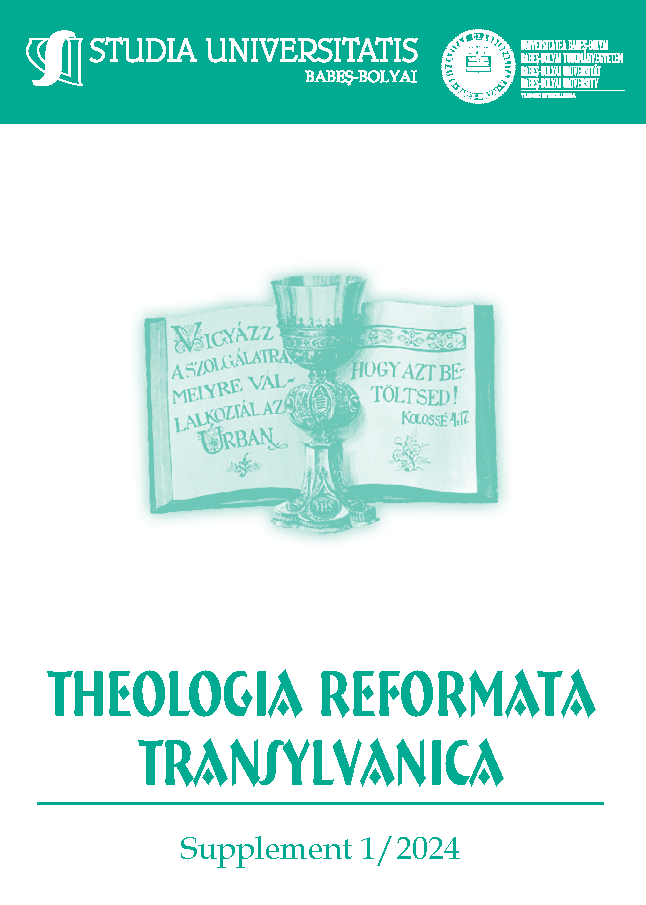Pathfinders. István Török (1903–1996) in the Church – Against the Church – For the Church
DOI:
https://doi.org/10.24193/subbtref.69.suppl1.01Keywords:
Protestantism in the 20 ᵗʰ century, dialectical theology, ethical dimensions of Christian life, freedom of the churchAbstract
The life and theological work of István Török (1903–1996) clearly illustrate the alternations of Protestantism in the 20th century and at the same time reflect the changes in the circumstances of the Hungarian Reformed Church. From the beginning of his career, first as a teacher at the Papal Reformed Theological Academy and then as a professor at Tisza István University of Debrecen, he participated in the theological debates. These reflections helped the orientations of the Church. During the years of communism, his publishing activities were limited, and after 1956 he was suspended from his teaching position. Nevertheless, he delivered many lectures to his former students at the so-called “black conferences”. In the period around the regime change (1989–1991), he rejoined the public life of the Church with several writings. Significant theological turns require freedom, when the Church paves the way for the eternal, even at the cost of conflict or self-restraint.References
BALMES, Jakab (1865–1866): A protestantismus és katholicismus vonatkozással az europai polgárisodásra I–II. In: Magyar Egyházirodalmi Iskola. 28–29 (1865–66).
BARCZA, József (1996): Dr. Török István emlékezete. In: Confessio. 20, 3. 75–78.
BARTHA, Tibor – MAKKAI, László (eds.) (1983): Studia et Acta Ecclesiastica V., Tanulmányok a magyarországi református egyház történetéből, 1867–1978. Budapest, MRE Zsinati Irodájának Sajtóosztálya.
BOGÁRDI SZABÓ, István (1995): Egyházvezetés és teológia a Magyarországi Református Egyházban 1948 és 1989 között. (Societas et Ecclesia 3). Doctoral thesis. Debrecen.
BRAD, Gregory (2015): The Unintended Reformation. Cambridge, Harvard University Press.
FEKETE, Károly, ifj. (1995): A keresztséggel kapcsolatos tanulmányok kritikai összefoglalása. In: Theológiai Szemle. 38, 6. 363–370.
FÜSTI-MOLNÁR, Szilveszter (2008): Ecclesia sine macula et ruga: Donatist Factors among the Ecclesiological Challenges for the Reformed Church of Hungary, especially after 1989/90. Sárospatak, SRTA.
HORVÁTH, Erzsébet: History of the Hungarian Reformed Church through the Communist Era (1945–1989). https://zsinatileveltar.hu/node/18 (accessed on: 11/30/2023).
HOTORÁN, János Gábor (2019): “...A kinél pedig az igém van, beszéljeazz én igémet igazán”, Török István, az igeteológus. Hittudományi doktori értekezés a rendszeres teológia tárgyköréből. Debrecen. 239. https://dea.lib.unideb.hu/server/api/core/bitstreams/bfa2ac08-f7c6-4ed2-be02-c93c98ad7503/content (accessed on: 11/30/2023).
HROMÁDKA, Josef (1959): Az egyház a hidegháború korában. Paper presented at the 2nd session of the Christian Peace Conference in Prague. In: Theológiai Szemle. 2, 5–6. 181–182.
IGNÁCZ, Lilla (2007): Hermeneutika és teológia Rudolf Bultmann gondolkodásában. Doctoral thesis. Budapest, ELTE BTK. https://doktori.btk.elte.hu/phil/ignacz/ignacz_dissz_hun.pdf (accessed on: 11/30/2023).
KISS, Réka (ed.) (2007): Kelt mint fent. Iratok a Református Megújulási Mozgalom történetéből. (1956–1957). Budapest, Dunamelléki Református Egyházkerület.
KOVÁCS, I. Gábor (2014): Török István. In: Kovács, I. Gábor (ed.): Hit – tudomány – közélet. Budapest, Eötvös Kiadó. 136–141.
KUTTER, Hermann (1938): Vallásos liberalizmus – keresztyén szabadság. In: Protestáns Szemle. 47, 5. 249.
NAGY, Barna (1938): Barth Károly politikai theológiája. In: Sárospataki Református Lapok. 33, 48. 238.
TÖRÖK, István (1931): Barth Károly teológiájának kezdetei. Doctoral thesis. Pápa. 3.
(1936): Az Ószövetség értékelése Kálvin Institutiójában. In: Kálvin és a kálvinizmus. Tanulmányok. Debrecen, Debrecen sz. kir. város és a Tiszántúli református egyházkerület könyvnyomda-vállalata. 121–138.
(1937): Csak kárhozatot ennék és innék a reverzálist adó egyháztag az úrasztalánál? In: Dunántúli Protestáns Lap. 48, 49. 235–236.
(1938): Protestáns Hitvallás. In: Protestáns Szemle. 47, 3. 353–359.
(1940): A házasság keresztyén jellege. Pápa. 29–31, 69–74.
(1942): A mai magyarországi református theológia helyzetképe. In: Theológiai Szemle. 18, 1. 28–37.
(1943a): Korunk theológiai kérdései. In: Theológiai Szemle. 19, 3. 151–162.
(1943b): Az egyházkritika. In: Theológiai Szemle. 19, 4. 200.
(1985): Dogmatika. Amsterdam.
(1994): Barth Károly theológiájának kezdetei. Debrecen.
(1996): Felszámolás és újrakezdés. Ed. by József Barcza. In: Confessio. 20, 2. 78–83.
(2000): Kereszténységünk a szocializmus történelmi korszakában. In: Egyháztörténeti Szemle. 1, 2. 88–97.
VAJTA, Vilmos (1987): Die „diakonische Theologie“ im Gesselschaftssystem Ungarns. Frankfurt am Main, Vrlg. Otto Lembeck.
Downloads
Published
How to Cite
Issue
Section
License
Copyright (c) 2024 Studia Universitatis Babeș-Bolyai Theologia Reformata Transylvanica

This work is licensed under a Creative Commons Attribution-NonCommercial-NoDerivatives 4.0 International License.






